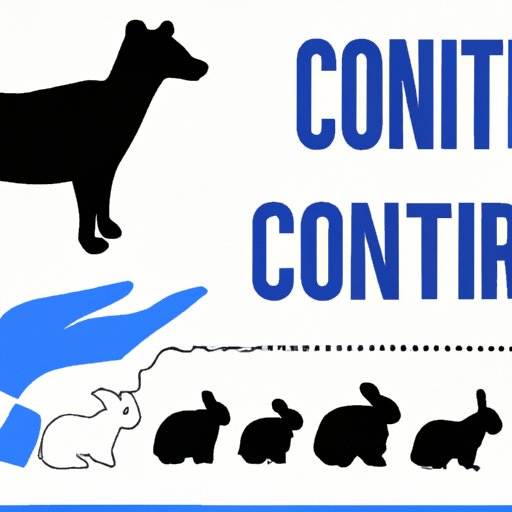
Introduction
Animal control is a term that refers to the management and regulation of domestic animals and wildlife. From preventing animal abuse to ensuring public safety, animal control agencies play a crucial role in our communities. One common question is whether or not animal control services are free. In this article, we will explore the costs of animal control, the benefits of these services, how to navigate the system, and address common myths.
Understanding Animal Control Costs: Is It Always Free?
Animal control services may or may not be free, depending on the circumstances. The cost of animal control services can vary from one agency to another, depending on several factors. Factors that influence the cost of animal control services include:
- The location of the animal control agency
- The size of the agency
- The types of services provided
- The funding sources available
Animal control agencies typically receive funding from a combination of sources, which may include:
- Taxpayer dollars
- Donations from private organizations
- Fines and penalties assessed against animal owners
There are situations in which animal control services are not free. For example, if an animal is impounded, its owner may be required to pay a fee to reclaim it. Additionally, if an animal is involved in an attack or damages property, the owner may be responsible for paying damages or fines.
How Animal Control Services Benefit Both Animals and Humans
Animal control agencies provide a variety of services aimed at protecting both animals and humans. These services may include:
- Enforcing animal control laws
- Investigating reports of animal abuse or neglect
- Capturing and impounding stray animals
- Providing emergency response for animal-related incidents
- Conducting education and outreach programs
The benefits of these services are numerous. Animal control agencies help to promote public health and safety by responding to reports of dangerous animals, enforcing laws related to animals, and reducing the spread of diseases such as rabies. Animal control agencies also protect animals from abuse, neglect, abandonment, and cruelty. Through education and outreach programs, these agencies also help to promote responsible pet ownership and prevent animal-related problems before they occur.
Real-life examples of how animal control services have helped both animals and humans include:
- Rescuing pets from abusive owners
- Capturing and removing dangerous animals from public areas
- Educating the public on responsible pet ownership
- Helping to find lost pets and reunite them with their owners
- Providing emergency treatment to injured or sick animals
Navigating the Animal Control System: What You Need to Know
If you need to navigate the animal control system, it’s important to understand the process and what to expect. Here’s a step-by-step guide for pet owners:
- If you have an animal-related emergency, call your local animal control agency or the police department.
- If you need to report an animal-related issue, such as a stray animal or animal abuse, contact your local animal control agency.
- If you lose a pet, contact your local animal control agency, post flyers, and check with local shelters and veterinarians.
- If your pet is impounded, you may be required to pay fees to reclaim it.
- If you have a complaint about a specific animal, submit a written report to your local animal control agency.
It’s important to note that animal control agencies are not responsible for providing veterinary care for sick or injured animals that are found in the community. If you find a sick or injured animal, contact your local veterinarian or animal shelter for assistance.
Animal Control Myths and Misunderstandings: Separating Fact from Fiction
There are several common myths and misunderstandings about animal control, so it’s important to separate fact from fiction. Here are some commonly held beliefs and the truth behind them:
- Myth: Animal control agencies are only concerned with dogs and cats.
- Fact: Animal control agencies regulate a wide variety of animals, including wildlife and livestock.
- Myth: Animal control agencies only exist to capture and kill animals.
- Fact: While euthanasia is sometimes necessary, animal control agencies generally work to find homes for adoptable animals.
- Myth: Only irresponsible pet owners have to deal with animal control agencies.
- Fact: Animal control agencies serve as a resource for all pet owners, not just those who are irresponsible.
Working with Animal Control: How Pet Owners Can Build a Positive Relationship
Building a positive relationship with your local animal control agency can be beneficial for you and your pet. Here are some tips for working effectively with animal control:
- Be a responsible pet owner by following licensing requirements, keeping your pet up-to-date on vaccinations, and preventing your pet from becoming a nuisance in the community.
- If you have a complaint about an animal, submit a written report with as much detail as possible.
- Use animal control as a resource if you have questions or concerns about your pet.
- Participate in education and outreach programs offered by animal control agencies.
Finally, the best way to prevent the need for animal control services is to be a responsible pet owner. This means providing your pet with appropriate food, shelter, and medical care, as well as preventing your pet from roaming free in the community and causing problems.
Conclusion
In conclusion, animal control services aren’t always free, and the costs may vary depending on various factors. However, animal control agencies play a vital role in promoting public safety and protecting animals from abuse, neglect, and cruelty. Navigating the animal control system can be confusing, but by working effectively with your local animal control agency, you can ensure that your pets stay safe and happy. Separating fact from fiction and knowing the truth behind common myths can also help you develop a positive relationship with animal control. Remember that being a responsible pet owner is the best way to prevent animal-related problems and keep your pets safe and healthy.





